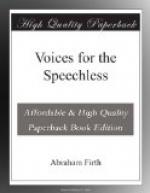And should not I spare Nineveh, that great city, wherein are more than sixscore thousand persons that cannot discern between their right hand and their left hand, and also much cattle?—Jonah iv. 11.
For the scripture saith, Thou shalt not muzzle the ox that treadeth out the corn.—1 Tim. v. 18.
Blessed are the merciful: for they shall obtain mercy. Matt. v. 7.
Behold the fowls of the air: for they sow not, neither do they reap, nor gather into barns; yet your heavenly Father feedeth them.—Matt. vi. 26.
Are not five sparrows sold for two farthings, and not one of them is forgotten before God?—Luke xii. 6.
VOICES FOR THE SPEECHLESS.
* * * * *
A prayer.
Maker of earth and sea and
sky,
Creation’s
sovereign, Lord and King,
Who hung the starry worlds
on high,
And formed alike
the sparrow’s wing:
Bless the dumb creatures of
thy care,
And listen to their voiceless
prayer.
For us they toil, for us they
die,
These humble creatures
Thou hast made;
How shall we dare their rights
deny,
On whom thy seal
of love is laid?
Teach Thou our hearts to hear
their plea,
As Thou dost man’s in
prayer to Thee!
Emily B. Lord.
* * * * *
He prayeth best.
O wedding guest! this soul
hath been
Alone on a wide,
wide sea:
So lonely ’twas, that
God himself
Scarce seemed
there to be.
O sweeter than the marriage
feast,
’Tis sweeter
far to me,
To walk together to the kirk
With a goodly
company!—
To walk together to the kirk,
And all together
pray,
While each to his great Father
bends,
Old man, and babes, and loving
friends,
And youths and
maidens gay!
Farewell! farewell! but this
I tell
To thee, thou
wedding guest!
He prayeth well, who loveth
well
Both man and bird
and beast.
He prayeth best, who loveth
best
All things both
great and small;
For the dear God who loveth
us,
He made and loveth
all.
S. T. Coleridge.
* * * * *
Our morality on trial.
Bishop Butler affirmed that it was on the simple fact of a creature being sentient, i.e. capable of pain and pleasure, that rests our responsibility to save it pain and give it pleasure. There is no evading this obligation, then, as regards the lower animals, by the plea that they are not moral beings; it is our morality, not theirs, which is in question.
Miss F. P. Cobbe.
* * * * *




